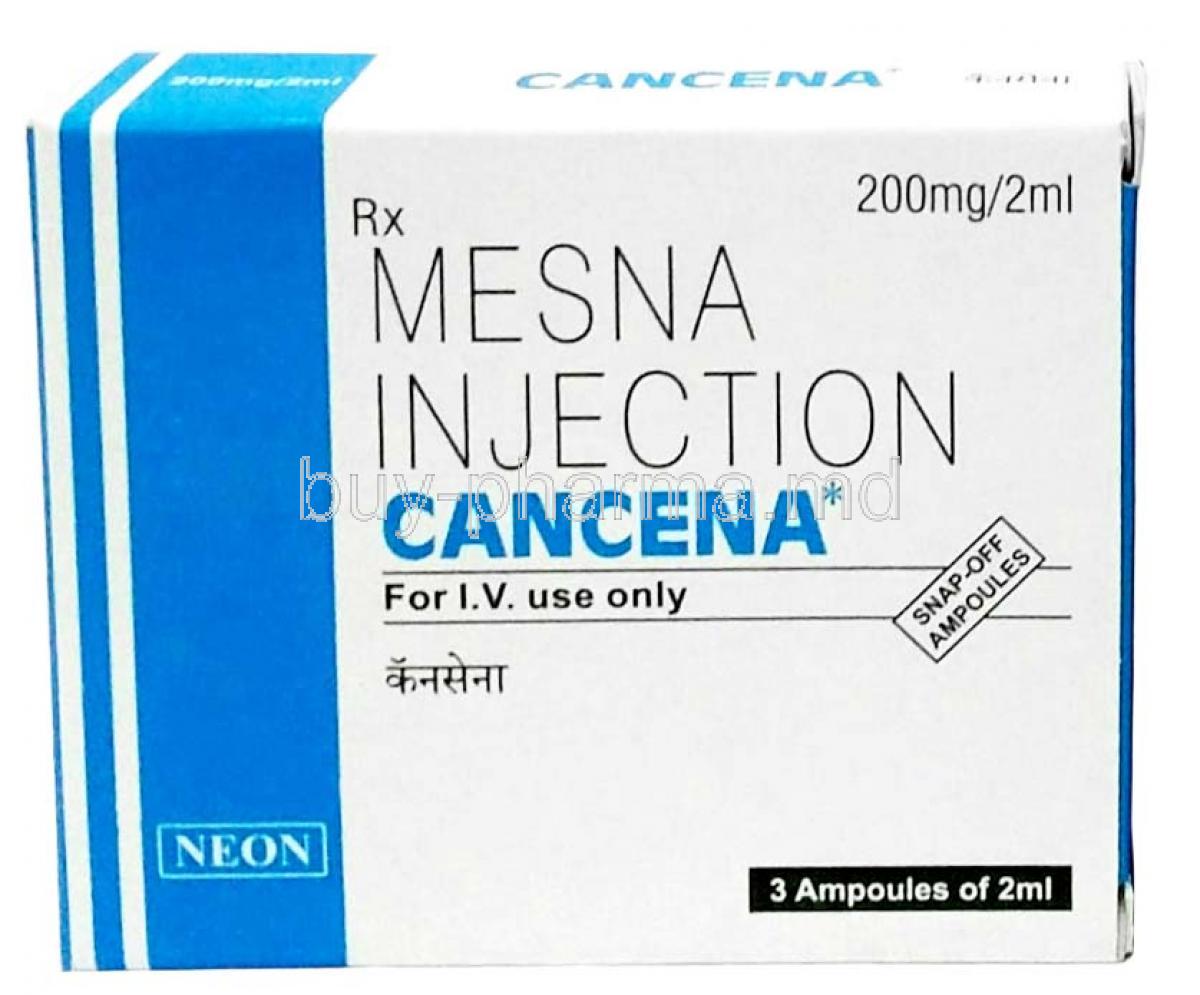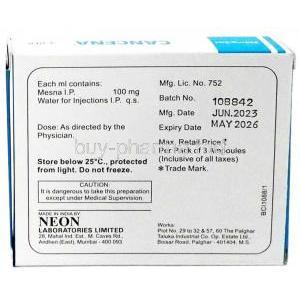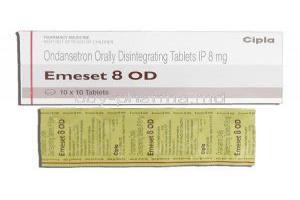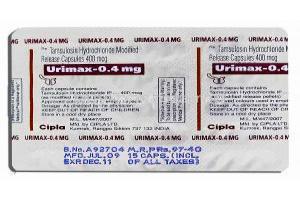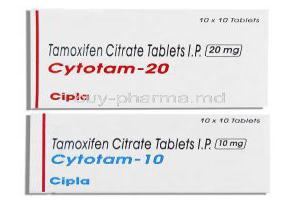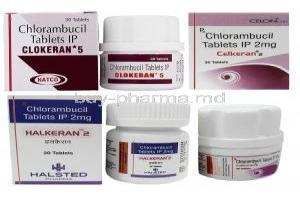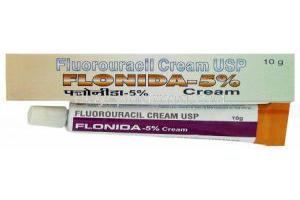MESNA
- I. Introduction
- II. Composition of MESNA
- III. How MESNA Works
- IV. Approved Uses of MESNA
- V. Off-Label Uses of MESNA
- VI. Dosage and Administration
- VII. Special Administration Cases
- VIII. Common Side Effects
- IX. Serious Side Effects and Warnings
- X. Important Precautions
- XI. Contraindications
- XII. Careful Administration
- XIII. Storage and Handling Precautions
- XIV. Overdose Management
- XV. Conclusion
I. Introduction
Brief Overview of MESNA
MESNA, which stands for Mercaptoethanesulfonate sodium, is a medication frequently employed as an adjuvant to safeguard the bladder against the impacts of specific chemotherapy drugs. Its crucial function in reducing the occurrence of hemorrhagic cystitis, a potentially life-threatening complication, has made it an essential component in oncology treatments.
Importance in the Medical Field
MESNA plays a role in preventing urological damage caused by chemotherapy, making it an essential component of supportive cancer treatment. In addition to its use in oncology, MESNA has a wide range of applications across different medical specialties, further expanding its therapeutic benefits.
Scope of the Article
This article seeks to clarify the structure, how it works, approved and unapproved applications, and other essential aspects of MESNA that make it significant in pharmacology.
II. Composition of MESNA
Chemical Structure
MESNA is a compound that contains sulfur and has the formula C2H5NaO3S2. Its unique structure allows it to counteract metabolites in the urological system, providing a protective function.
Active and Inactive Components
Active Ingredient: Sodium 2 mercaptoethane sulfonate Ingredients: Sodium chloride, sterile water for injection, and other components.
Pharmacological Class
MESNA is classified as a detoxifying agent that functions explicitly as an agent.
III. How MESNA Works
Mechanism of Action
MESNA creates complexes, with acrolein and other harmful metabolites found in urine, helping to safely remove them from the body and reduce potential harm to the bladder.
Biological Pathways Affected
It mainly affects the metabolic pathways involving sulfhydryl, rendering the electrophilic byproducts generated during chemotherapy.
Duration of Effect
Its protective effects require administration due to its half-life lasting around 1 to 4 hours.
IV. Approved Uses of MESNA
Use in Reducing Hemorrhagic Cystitis
MESNA is a medication that is commonly used to prevent the occurrence of cystitis caused by chemotherapy drugs, like cyclophosphamide 1234.
Here are some references that provide more information about MESNA:
- DrugBank Online: Mesna
- National Cancer Institute: Mesna
- UpToDate: Chemotherapy and radiation-related hemorrhagic cystitis in cancer patients
- MedlinePlus: Mesna
Role in Chemotherapy Protocols
MESNA is a medication that is commonly used to prevent the occurrence of cystitis caused by chemotherapy drugs, like cyclophosphamide 1234. It is often used in combination with other chemotherapy drugs 5.
Here are some references that provide more information about MESNA:
- DrugBank Online: Mesna
- National Cancer Institute: Mesna
- UpToDate: Chemotherapy and radiation-related hemorrhagic cystitis in cancer patients
- MedlinePlus: Mesna
- Hematology/Oncology Clinics of North America: Chemotherapy-Induced Hemorrhagic Cystitis
Additional FDA-Approved Indications
MESNA is a medication that is commonly used to prevent the occurrence of cystitis caused by chemotherapy drugs, like cyclophosphamide 1234. It is often used in combination with other chemotherapy drugs 5.
Here are some references that provide more information about MESNA:
- DrugBank Online: Mesna
- National Cancer Institute: Mesna
- UpToDate: Chemotherapy and radiation-related hemorrhagic cystitis in cancer patients
- MedlinePlus: Mesna
- Hematology/Oncology Clinics of North America: Chemotherapy-Induced Hemorrhagic Cystitis
V. Off-Label Uses of MESNA
Uses in Rheumatological Conditions
While the FDA has not approved MESNA, it has been used as a treatment, for specific autoimmune conditions.
Applications in Respiratory Diseases
Based on experiments, evidence indicates that it may have advantages in reducing respiratory symptoms because of its ability to thin mucus.
Ongoing Research for Potential New Uses
Scientists are researching how it can be applied in fields such as neurology and endocrinology.
VI. Dosage and Administration
Standard Dosage Guidelines
The usual recommended dose falls within the range of 600 1200 mg/m2. It can vary depending on the specific chemotherapy treatment and individual patient factors.

Modes of Administration: Intravenous vs. Oral
Intravenous administration provides a response, but it necessitates a hospital environment. On the hand, oral administration is more convenient, although it has lower bioavailability.
Factors Influencing Dose Adjustments
The patient's kidney function medications the patient is taking at the same time. How severe the disease being treated is
VII. Special Administration Cases
a. Administration to the Elderly
Dose Modifications
As people get older, their bodies go through changes, which may result in the need for lower medication doses. This is often because their kidney function tends to decrease with age.
Monitoring Parameters
Monitoring the kidney and liver function in this specific group of people is essential.
b. Administration to Pregnant Women and Nursing Mothers
Safety Profile
There is a lack of data regarding the safety of this product during pregnancy, which means we need to carefully assess the risks and benefits.
Recommendations
When the potential risks outweigh the benefits, it may be necessary to consider discontinuing or exploring alternative treatment options.
c. Administration to Children
Age-Specific Dose
Accurate dosing is crucial. It is frequently calculated based on the body surface area when dealing with pediatric populations.
Pediatric Monitoring
Paying attention to the renal and hepatic parameters in this vulnerable group is crucial.
VIII. Common Side Effects
Mild Side Effects: Nausea, Fatigue
Although typically well-tolerated individuals may encounter adverse effects such as nausea and tiredness, which generally subside on their own.
Moderate Side Effects: Diarrhea, Vomiting
Some more. Still, quite manageable side effects can include diarrhea and vomiting. To control these symptoms, antiemetics can be given.
Management of Side Effects
Depending on how severe the side effects it might be worth considering providing symptomatic relief and temporarily stopping the therapy.
IX. Serious Side Effects and Warnings
Severe Side Effects: Allergic Reactions, Blood Disorders
Although MESNA is generally well tolerated, it is not entirely free from side effects. In some cases, allergic reactions can occur, leading to symptoms like hives, swelling of the face, and even anaphylaxis. There have also been reported instances of blood disorders such as white blood cell count (leukopenia) and low platelet count (thrombocytopenia). These abnormalities require medical attention.
Black Box Warnings if Any
Based on the medical research, there are no Black Box warnings linked to MESNA, which suggests that it has a generally safe profile.
X. Important Precautions
Pre-administration Testing
Before administering MESNA it is essential to conduct a medical assessment that includes tests to evaluate kidney and liver function. This evaluation serves as a measure to avoid any potential complications.
When to Stop Using MESNA
If you experience severe side effects or notice significant changes in your lab results while taking MESNA it is crucial to stop taking it immediately. Make sure to consult with your healthcare providers in situations.
XI. Contraindications
Known Allergies
If you have had an allergic reaction, to MESNA or any of its components, it is absolutely not recommended for you to use it.
Medical Conditions where MESNA Should be Avoided
Although MESNA does not have a list of contraindications, it is recommended to be cautious when prescribing it to patients with a history of blood disorders and severe kidney problems.
XII. Careful Administration
Drug Interactions
While MESNA is generally considered safe to use, it's important to note that it can interact with certain medications. Some examples of these medications include Warfarin, Phenprocoumon, and other nephrotoxic agents.
Interaction with Alcohol and Food
Drinking alcohol at the same time as taking medication can increase the chances of experiencing adverse effects on your kidneys so it is generally advised to avoid doing so.
Special Cases Needing Medical Supervision
People who already have kidney or liver problems People who are receiving chemotherapy drugs People who are taking medication to prevent blood clots
XIII. Storage and Handling Precautions
Storage Conditions
MESNA should be kept at a temperature ranging from 20 to 25 degrees Celsius in a location shielded from sunlight and moisture.
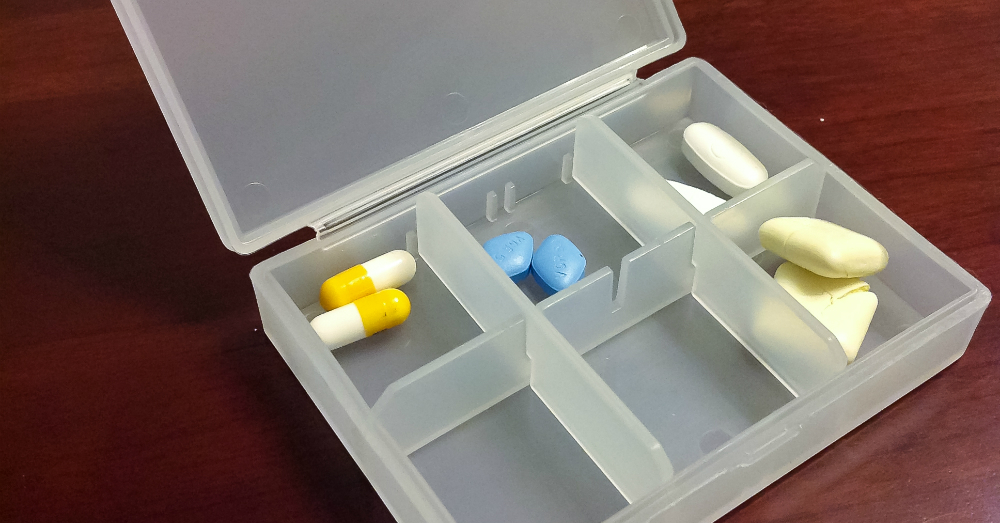
Shelf Life
The typical duration that a product can be stored without losing its quality is usually between 2 to 3 years, depending on how it's stored.
Safe Disposal Methods
It is essential to dispose of unused MESNA in compliance with local environmental regulations. The ideal method would be to return it to a pharmacy or a designated medical waste disposal facility.
XIV. Overdose Management
Symptoms of Overdose
Excessive consumption may lead to digestive issues disruptions in the nervous system, and significant imbalances, in metabolism.
Emergency Response Measures
In case of an overdose, it is crucial to seek medical assistance. This may involve procedures like lavage administering fluids through an IV, and providing symptomatic treatment as needed.
Long-Term Complications
Consistently taking much medication can cause permanent harm to the kidneys and liver, which would then require ongoing medical monitoring.
XV. Conclusion
Summary of Key Points
MESNA plays a role in reducing the harmful effects of chemotherapy on the urinary system. It is generally considered safe. It's essential to be aware that there may still be some potential risks and interactions associated with its use.
Importance of Medical Supervision
Ensuring medical supervision is crucial to achieving the best treatment results while reducing the risk of any possible complications.
Future Research Directions
More research is needed to understand the potential benefits of MESNA in various medical fields and to improve dosage recommendations for specific groups of patients.

